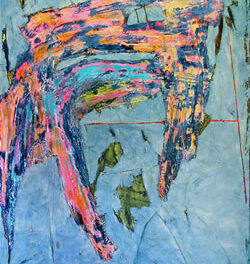The most impressive item in Duke Drama’s current production of Caryl Churchill’s epic satire Cloud Nine is Jan Chambers’ set, or rather, sets. Enclosed above and on both sides by black panels decorated with foliage, these beautiful creations also contain a frame within the frame, decorated by skyscapes of yellow, red, or blue; moving cloud formations; the Union Jack. For the Africa of the first act, Chambers provides suggestions of hanging latticework and a British Colonial door suspended above the ground; for the America of the second, a park. Greenery adorns the apron and set pieces. This is superbly stylized architecture for a marvelously stylized social comedy.
Unfortunately, little else in the production supports the play as Chambers does. There is a certain provisionary quality to much of the acting, in a play that is anything but tentative. Churchill’s conceit — that the repressions of Victorian society still underlie, and constrict, modern behavior no matter how “enlightened” its participants — is pretext for an all-out assault on the dangerous absurdity of these William Bennett-like virtues. The comedy is wild — something like a slightly pornographic vaudeville — which makes the unspoken horror of its implications all the more affecting.
To work, the acting must be (at least in Act One) overtly outrageous yet recognizably human: Groucho Marx in Waiting for Godot. Of the Duke ensemble, only Greg Anderson, Amit Mahtaney, and Richard McCray are entirely comfortable with the energized commedia dell’arte style of the first act, whereas Anderson, McCray, Brian Schroeder, and Meghan Valerio alone are entirely audible in the second; bereft of the first act’s declamatory, lampooning style, the actors drop their volume correspondingly. Occasionally the acting is, ironically, too stylized — or at least, too quick — for discernable emotion reaction by the characters. The vicious slap by father to son should hurt, us as well as the boy; instead it seems merely a glancing blow, too hurriedly moved on from to create much of an impact.
Jeff Storer’s direction, usually exciting, suffers by other means as well, particularly in his ill-advised transformation of Act Two from London in the early 1980s to America, circa 2002. This leads to some baffling references (“the baths”? are there any left?) and unfortunate interpolations (Afghanistan) which Churchill’s text simply can’t explain, or support. In addition, Kay Webb’s otherwise apt first act costumes not only do not look at all lived in, they hang oddly on the performers, as though they weren’t well-fitted to begin with.
Best in this cast: Anderson, as a big game hunter whose preening machismo closets his sexuality and as an accommodating yet sexist husband; Mahateny’s Victorian father-figure, all booming tones and smirking self-satisfaction; McCay, as believably childlike in Act Two as he is duplicitously self-hating in Act One; and Valerio, pitch-perfect as the emotionally smothered matriarch of the second act whose final monologue is so moving and so lacking in self-pity.
Duke Drama presents Cloud Nine Friday-Saturday, Nov. 1-2, at 8 p.m. in Reynolds Theater in the Bryan Center on Duke University’s West Campus. $9 ($7 students and seniors). 919/684-4444. http://www.tickets.duke.edu/ or http://www.duke.edu/web/theaterstudies/.
& 10/31/02 Editorial by Robert W. McDowell: Scott Ross Joins Robert’s Reviews
Award-winning local playwright and theater and movie critic Scott Ross accepted my invitation to write reviews for this theatrical newsletter in time to cover Cloud Nine (Duke Drama) and Follies (Meredith Performs Theatre) for the current issue of Robert’s Reviews. A former theater critic for Spectator Magazine (1981-86) and movie reviewer for Raleigh’s News & Observer (1986-91), Scott won the Thompson Theatre Playwright Award (professional category) in 1995 for The Dogs of Foo, which University Theatre at N.C. State produced in 1996. His ripped-the-headlines drama, A Liberal Education, debuted in Thompson Studio Theatre in 2000.
Scott formerly served as dance, comedy and theater editor for http://triangle.citysearch.com/. He also penned two musical revues — I Love A Piano: The Music of Irving Berlin and Serenading The Moon: The Songs of Johnny Mercer — for University Theatre’s annual TheatreFest series.
Scott Ross currently works full-time for the state, and Robert’s Reviews is extremely lucky to be able to publish his critical insights on these pages.











